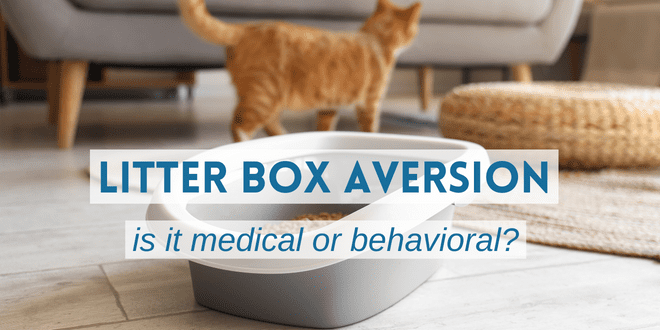
When a cat eliminates outside of the litter box it’s probably the most frustrating behavior a cat parent ever has to cope with. All of a sudden, the cat who never caused any problems has suddenly started viewing the dining room carpet or living room sofa as makeshift litter boxes. Plastic coverings start making their way onto the sofa, the dining room becomes off limits, the box is cleaned to perfection and the cat parent starts looking at the beloved family cat as a total stranger.
When a cat eliminates outside of the box he isn’t being spiteful, stupid or willfully disobedient. The cat is trying to solve a problem. It may not make sense to you but it makes perfect sense to the cat. For some reason the cat feels he can’t use the box. Your job, as the one with the bigger brain, is to figure out why.
Address Potential Medical Issues First
In many cases, litter box aversion has an underlying medical cause. It could be a lower urinary tract issue, the start of renal failure, diabetes, IBD, constipation, diarrhea, or a number of other medically-related issues. Very often, what happens is that the cat associates the pain with the box itself. The cat thinks if he eliminates somewhere else it won’t hurt so much. In the case of urinary issues, the cat may try to retain the urine as long as possible because it hurts too much to pee. When the bladder reaches maximum capacity the cat may not be close enough to the box to get there in time. With some urinary problems the accumulation of any amount of urine in the bladder can cause pain so he will pee in small drops throughout the house. And, if you see traces of blood in the urine (either on the carpet or in the litter box), then you know there’s definitely something going on that needs immediate medical attention.
If dealing with litter box avoidance in an older cat, there could be age-related cognitive issues going on, or maybe arthritis is making it too painful for the cat to go up and stairs to reach the box.
Pooping Outside of the Litter Box
When it comes to leaving fecal deposits outside of the box, the cat may by experiencing painful stomach cramping due to gas accumulation and feels the need to try to eliminate immediately, no matter the location. Inflammatory Bowel Disease is one condition that can commonly result in the cat having to eliminate frequently due to cramping and pain. A change in diet or if he has gotten into something not on the normal mealtime menu, may have caused diarrhea. If there’s constipation and the cat doesn’t feel safe in the litter box due to other cats in the home, or if he feels better walking while attempting defecation, you may notice fecal waste in unexpected places despite the fact you’ve kept the litter box perfectly clean.
A Visit to the Veterinarian Should Always be First on Your List
No matter how convinced you are that a litter box problem is behavioral, don’t overlook that all-important trip to the veterinarian to rule out any underlying medical cause. If you simply assume it’s behavioral, you may cause your cat to suffer needlessly.
Any change in your cat’s behavior, litter box habits, appetite, or water consumption, should be viewed as a potential medical red flag. Always have your cat checked by the veterinarian as soon as you notice a change.
Some Signs of Potential Medical Problems
- increased or decreased urination
- elimination outside of the litter box
- frequent trips to the litter box
- crying or straining while in the litter box
- voiding only small amounts of urine
- change in urine color
- change in urine odor
- traces of blood in urine
- painful abdomen
- distended abdomen
- change in fecal color
- change in fecal odor
- diarrhea
- constipation
- blood in feces
- mucus in feces
- excessive gas
- weight loss
- restlessness
- irritability
- change in appetite
- change in water consumption
- inability to urinate (this is an absolute EMERGENCY)
- frequent licking of genital area
- depression
- ammonia odor to the breath
- vomiting
- excessive vocalization
Deal With Litter Box Set-up and Behavior Issues Once You’ve Ruled Out Medical Problems
You certainly don’t want your cat to suffer at all and that’s one very important reason a veterinarian check-up is so crucial. If there is a medical problem, catching it in the earliest stage will also increase the chances for a quick recovery.
Once your cat gets a clean bill of health, you can then begin the investigation into what is causing the problem from a behavioral standpoint. Even if there is a medical issue diagnosed, you may still have to do some behavior work as well to get your cat back on track and feeling comfortable with using the litter box again.
As you begin your investigation into the behavioral cause of the litter box avoidance, here’s a list of some possibilities:
- dirty litter box set-up
- unappealing litter box style (covered, electronic, too small)
- unappealing litter (type, depth)
- unappealing litter box location
- too few litter boxes for the number of cats in the home
- multicat tension
- stressful environment
- abrupt changes (litter type, food, schedules)
- traumatic events (death in the family, divorce, moving, new baby, new pet)
- outdoor issues (seeing an unfamiliar cat outdoors)
- having been punished in the past for the behavior
Something else to consider is Pandora Syndrome. A study done at the Ohio State University revealed that when it comes to feline urinary issues, it was more than just being about the bladder. There was a connection between the urinary recurrences and stress. The leader of the study, Dr. Tony Buffington, coined the term for these urinary issues, Pandora Syndrome, after the Greek myth of Pandora’s box. The research connects stress to frequent recurrences of Feline Idiopathic Cystitis.
Need More Information?
If you have questions about your cat not using the litter box, see your veterinarian. For more information about litter box set-up and dealing with behavior issues, refer to the books by best-selling author, Pam Johnson-Bennett. Pam’s books are available at bookstores and online. We’ve included Amazon links here on our website.
If you have a question regarding your cat’s behavior or health, contact your veterinarian. This article is not intended as a replacement for your cat’s veterinary care. This article is for information purposes only and not offering medical advice or providing a medical diagnosis.
 Problem Solving & Advice by Pam Johnson-Bennett Cat Behavior Expert & Best-selling Author
Problem Solving & Advice by Pam Johnson-Bennett Cat Behavior Expert & Best-selling Author





